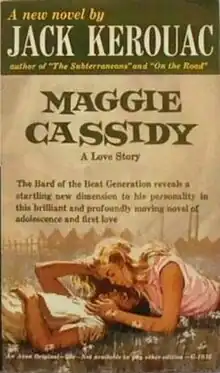Maggie Cassidy
Maggie Cassidy is a novel by the American writer Jack Kerouac, first published in 1959. It is a largely autobiographical work about Kerouac's early life in Lowell, Massachusetts, from 1938 to 1939, and chronicles his real-life relationship with his teenage sweetheart Mary Carney. It is unique for Kerouac for its high school setting and teenage characters. He wrote the novel in 1953 but it was not published until 1959, after the success of On the Road (1957).
 First edition | |
| Author | Jack Kerouac |
|---|---|
| Country | United States |
| Language | English |
| Publisher | Avon |
Publication date | 1959 |
| Media type | Print (Hardback & Paperback) |
| Pages | 208 pp |
| Preceded by | Doctor Sax (1959) |
| Followed by | Tristessa (1960) |
The original manuscript published by Avon Books in 1959 was almost immediately pulled from the shelves due to objections over profanity in one particular passage. The passage was rewritten and the book redistributed even though Kerouac reportedly objected to the changes . The original manuscript remained unpublished until 2015 when Devault-Graves Digital Editions restored the full uncut original manuscript for its print edition .
Plot
Part of what Kerouac considered the 'Duluoz Legend',[1] Maggie Cassidy tells the tale of Jack Duluoz and his romantic involvement with Irish-American Maggie Cassidy. Duluoz is a high school athletics and football star who meets Maggie Cassidy and begins a devoted, inconstant, tender adolescent love affair.[2]
Character key
Kerouac often based his fictional characters on friends and family.[3][4]
"Because of the objections of my early publishers I was not allowed to use the same personae names in each work."[5]
| Real-life person | Character name |
|---|---|
| Jack Kerouac | Jack Duluoz |
| Leo Kerouac | Emil "Pop" Duluoz |
| Caroline Kerouac | Nin / Jeannette Bissonette |
| George "G.J." Apostolos | G.J. Rigopoulos |
| Fred Bertrand | Vinny Bergerac |
| Mary Carney | Maggie Cassidy |
| Margaret "Peggy" Coffey | Pauline "Moe" Cole |
| Johnny Koumentzalis | Johnny Kazarakis |
| Lou Little | Lu Libble |
| Charles Morissette | Jimmy Bissonette |
| Robert Morissette | Joe (Iddyboy) Bissonette |
| Omar Noel | Zaza Vauriselle |
| Jim O'Dea | Timmy Clancy |
| Roland Salvas | Albert "Lousy" Lauzon |
| Charles Sampas | James G. Santos |
| Jimmy Winchell | Eddy Gilbert |
| Seymour Wyse | Lionel Smart |
Trivia
- One of the scenes in the novel is strongly reminiscent of a scene in The Sorrows of Young Werther. In Kerouac’s novel, a blizzard rages outside during a party organized for the seventeenth birthday of Jack Duluoz. The party is the start of the estrangement of Jack and Maggie. The first time Werther meets his Lotte is during a ball in the country whilst a storm (foreshadowing Werther’s demise) is passing outside.[6] Kerouac is known to have read Goethe.[7]
- The fictitious name of Kerouac’s girlfriend echoes the name of Neal Cassady. Who, under the fictitious name of Dean Moriarty, would be the centre of Kerouac’s attention in On the Road. Kerouac meant the two books to be part of the same life. Together with books such as The Subterraneans and The Dharma Bums they make up the Duluoz legend which Kerouac compared to Proust’s In Search of Lost Time. “[...]except that my remembrances are written on the run instead of afterwards in a sick bed.”[8]
References
- Barnett, David (24 July 2013). "Visions of Jack Kerouac... in an epic 13 volumes". The Guardian. Retrieved 15 May 2017.
- Kerouac, Jack (1959). Maggie Cassidy. Penguin Modern Classics. p. Back cover. ISBN 978-0-141-19003-7.
- Sandison, David. Jack Kerouac: An Illustrated Biography. Chicago: Chicago Review Press. 1999
- "Beatdom - Who's Who: A Guide to Kerouac's Characters".
- Kerouac, Jack. Visions of Cody. London and New York: Penguin Books Ltd. 1993.
- von Goethe, Johann Wolfgang (1774). . . Vol. Book 1 – via Wikisource.
- Moore, Dave. "Question: What writers and books most influenced Jack Kerouac? I am aware of Saroyan, Wolfe, Whitman, but that's about it". DHARMA beat. Retrieved 21 September 2013.
- Kerouac, Jack. Big Sur (Foreword).
- Kerouac, Jack (1959). Maggie Cassidy. Avon Books.